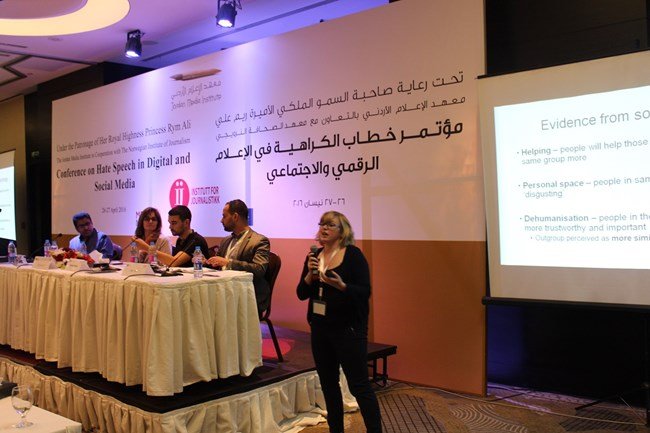Image:

04 May 2016
<strong>Hate Speech on Social and Digital Media Conference</strong><br />
<strong>Concluding Statement</strong><br />
Jordan Media Institute (JMI) organized Hate Speech on Social and Digital Media Conference on in cooperation with the Norwegian Institute of Journalism. The two day meeting on 26-27 April 2016 convened under the patronage of Her Royal Highness Princess Rym Ali, founder of the institute, with the participation of around 200 academics, media leaders, experts and activists. Twenty four papers were presented during the six sessions focusing on the following themes:
<ol>
<li>Hate speech and Arab media in the post Arab revolutions and transformations phase.</li>
<li>Content and characteristics of hate on digital and social media in the Arab world.</li>
<li>Content and hate speech produced by the Arab public: political, cultural and economic factors.</li>
<li>The role of media and information literacy in limiting hate speech.</li>
<li>New form of hate: case studies from the Arab world.</li>
<li>Ethics and professional standards in challenging hate speech: back to basics.</li>
<li>Legislative and regulatory frameworks to curb hate speech.</li>
</ol>
<br />
Participants from Jordan, Iraq, Syria, Saudi Arabia, Palestine, Morocco, Rwanda, Kosovo, Britain and Greece presented papers and exchanged views on the themes of the conference which drew to a close on 27 April with the following <strong>conclusions</strong>:
<ol>
<li>Hate speech is a form of racism and constitutes a complex socio-political and communication phenomenon. Arab societies have witnessed the growth of this phenomenon in shocking forms in conjunction with Arab political transformations and the mushrooming media outlets which directly and indirectly reflect the amount of political investment in the media. This in turn has created social and cultural ripe grounds for the spread of hate speech among adversaries and further polarization.</li>
<li>The last five years have seen Arab content on the Internet grow seven fold coupled with increased Arab presence on social media networks. The number of Arab activist bloggers also increased. However, this participation also brought traditional Arab political and social ailments to this large space. Social media also exposed the different aspects of hate speech which include redefining the past and reproducing cultural, social and political frameworks and narrow identities and ancient backgrounds. </li>
<li>The latest wave of hate speech came at a time the Arab media have yet to resolve issues pertaining to basic principles of freedom, professionalism and independence which have created grey areas between actions of politicians on the one hand and media work on the other, in addition to grey area between actions of activists on social media networks and those of professional journalists. And since the ambitions of politicians and their efforts to make gains cannot be curbed and neither can activists on social media, the only way to clear the grey area where hate speech is produced and promoted is for journalists to ensure the professionalism, independence and social responsibility of their profession. </li>
</ol>
<strong>Recommendations:</strong>
<ol>
<li>The urgent need to introduce Media Literacy (ML) into Arab systems of education. ML provides people with the skills to access information, deal with and understand the different media outlets as well as how to analyze the news and be able to produce content and become active participants in the process. There is a need to make ML a public opinion issue, especially in light of the political, cultural and media transformations taking place in Arab societies.</li>
<li>There can be no capacity building against hate speech in isolation of quality training that constitutes a solid basis for journalists. Ensuring the independence and professionalism of the media is the effective recipe against becoming a platform for hate speech or a simple mouthpiece for terrorists.</li>
<li>Encourage people to see media content with a critical eye and provide them with fact-checking tools. </li>
<li>One source of incitement and hate speech is the race for scoops between citizen journalists and social media on the one hand and mainstream media on the other. This competition for breaking news demands the presence of a general code of ethics and professional standards to govern the way professional media deal with citizen-produced content.</li>
<li>An urgent need for a global ethical initiative to address media coverage of religious issues and respond to questions about the limits of freedoms and respect for religions. This will ensure professional and fair coverage of religion-based conflicts and issues.</li>
<li>Political and social conflicts constitute attractive environments for polarization and hate which highlight the need to develop ethical editorial guidelines for media outlets to combat hate speech, incitement and polarization.</li>
<li>Change the media culture starting with newsrooms and through to the public in order to develop a balanced society that shuns extremism and is tolerant, respects diversity and is immune to hate speech.</li>
<li>Establish professional monitoring mechanisms of hate speech in the mainstream media and social and digital media; and public periodic reports.</li>
<li>Publish a guidebook of words that reflect hate speech in main stream and social media. </li>
</ol>



